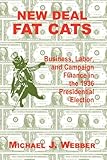New Deal Fat Cats : Campaign Finances and the Democratic Part in 1936 / Michael Webber.
Material type: TextPublisher: New York, NY : Fordham University Press, [2021]Copyright date: ©2000Description: 1 online resource (180 p.)Content type:
TextPublisher: New York, NY : Fordham University Press, [2021]Copyright date: ©2000Description: 1 online resource (180 p.)Content type: - 9780823219476
- 9780823296286
- online - DeGruyter
| Item type | Current library | Call number | URL | Status | Notes | Barcode | |
|---|---|---|---|---|---|---|---|
 eBook
eBook
|
Biblioteca "Angelicum" Pont. Univ. S.Tommaso d'Aquino Nuvola online | online - DeGruyter (Browse shelf(Opens below)) | Online access | Not for loan (Accesso limitato) | Accesso per gli utenti autorizzati / Access for authorized users | (dgr)9780823296286 |
Frontmatter -- CONTENTS -- TABLES -- ACKNOWLEDGMENTS -- 1. The New Deal in Historical and Theoretical IX XV Perspective -- 2. Deserters and Traitors: Did Business Desert the Democrats between 1932 and 1936? -- 3. The Mass-Consumption Sector and Democratic Party Finances -- 4. Industrial Structure and Party Competition during the New Deal: The Investment Theory of Politics Reconsidered -- 5. Roosevelt's "Soft Money Scandal": The Democratic Convention Book of 1936 -- 6. New York City and the South: The Role of Religion and Region in Financing the 1936 Election -- 7. Organized Labor's Political Baptism: FDR and the Unions -- 8. Conclusion -- METHODOLOGICAL APPENDIX -- REFERENCES -- INDEX
restricted access online access with authorization star
http://purl.org/coar/access_right/c_16ec
In New Deal Fat Cats, Michael Webber offers a fresh perspective on the New Deal. The author analyzes the role of various segments of society in party politics during the political change brought on by the Great Depression. Webber uses analysis of campaign contribution as a major method of evaluating the 1936 presidential election. Today’s readers may be surprised at the statistical breakdown of the group that reelected FDR. These groups ranged from southern Democrats and organized labor, to Catholics, Jews, and small businesses. A considerable portion of the author’s analysis rests on interpretive literature about the politics of the New Deal and specifically about the role of business in the construction of those politics. The emphasis of this work is on the coalition of what seem to be disparate elements in society suggesting that large and monolithic power blocks are not necessarily the road to major political change in U.S. society. The reader will begin to sense the seemingly divisive pressures from different groups that made the New Deal not only a paradox, but an effective social reality.
Mode of access: Internet via World Wide Web.
In English.
Description based on online resource; title from PDF title page (publisher's Web site, viewed 03. Jan 2023)


